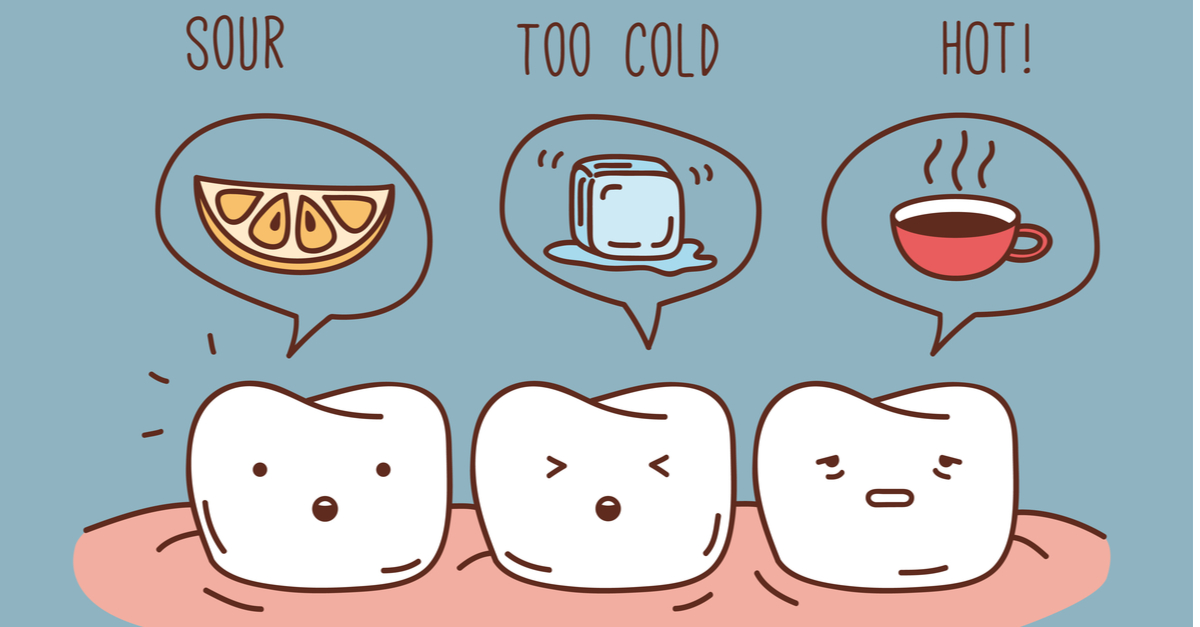Sensitive Teeth at West Pennant Hills Dentist
Some of us have noticed a pain in one or more teeth when we drink hot coffee or eat cold ice cream. Or a pain might arise when we eat spicy foods. A tooth becomes sensitive to hot and cold temperatures because it has been damaged. The most common form of damage is either thin outer enamel or receding gums. Occasionally a cavity will also cause a tooth to be sensitive to temperatures.
In more extreme cases the tooth is so sensitive that cold breath from breathing can cause pain.
Thin Tooth Enamel
Our natural teeth have a nerve in the centre. This is usually insulated from the outside by the surrounding body of the tooth. But if the outer body of the tooth becomes thin, if the outer tooth enamel is worn away, then the nerve will be more exposed to the environment in the mouth. This means any hot or cold liquids in the mouth will directly affect the nerve. They will feel very extreme.
Tooth enamel can become thin over time because of incorrect brushing. If we use a very stiff toothbrush, or if we press too hard, we will wear away the tooth enamel over time. This thin enamel leaves the tooth very sensitive.
Another cause of tooth sensitivity is brushing too soon after eating. If we eat or drink acidic foods or liquids then the enamel is temporarily softened. If we brush straight away, while the enamel is still soft, the enamel will start to wear away.
Wait 15 minutes after eating before brushing your teeth. Drink water and chew sugar-free gum after eating.
Receded Gums
Gums may recede as we get older, especially if we neglect to brush and floss, or if we have a gum infection. These receded gums leave the roots of the teeth exposed, which tends to make the teeth sensitive. The tooth roots have very little enamel, so the tooth nerve is not insulated from the outside. This nerve will feel pain from hot or cold temperatures.
Tooth Cavity
A cracked or significantly decayed tooth may expose the tooth nerve. This will make the nerve very sensitive to hot and cold temperatures. Such a problem needs to be repaired by the dentist.
Helping Sensitive Teeth.
We can avoid sensitive teeth by using a soft toothbrush and waiting 15 minutes after meals before brushing.
If the teeth are already sensitive we can use a toothpaste designed for sensitive teeth. This toothpaste must be left on the teeth, do not rinse off. It takes a few weeks for the teeth to lose their sensitivity. Look for Sensodyne or Colgate Sensitive.
Sensitive toothpaste will not work on a cavity or badly damaged tooth. it only works for thin enamel or exposed roots.
West Pennant Hills Dental
If you suffer teeth that are sensitive to the hot and cold then see the dentist. We can fix damaged teeth and advise treatment for thin enamel.
Information Disclaimer
The content of this article is meant for informational purposes only and should not be considered a source of professional advice, recommendations, or endorsements. It is not a substitute for seeking expert guidance or making well-informed decisions based on individual circumstances. Although we strive for accuracy and reliability, we cannot guarantee the information's completeness or suitability for all situations. Readers are urged to verify facts, consult experts, and consider their own context before taking actions or decisions based on this content. No warranties, explicit or implied, are provided regarding the accuracy, timeliness, or completeness of the presented information. Relying on this information is at the reader's own discretion and risk. We encourage readers to consult relevant professionals or experts for advice tailored to their specific needs. Neither the author, publisher, nor any affiliated parties will be held responsible for errors, omissions, or damages resulting from the use or reliance on the information in this article.

